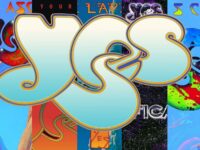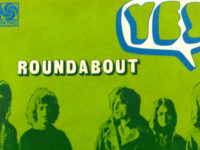The opening song on 1999’s The Ladder is one of the very rare (or perhaps even the only) example of a Yes product tie-in. “Homeworld (The Ladder)” was featured on a video game also called Homeworld. Some time later, guitarist Steve Howe registered his disinterest in the game. He exhibited a slight air of satisfaction that the predicted boost the collaboration would bring the band didn’t materialize.
However, Howe and the rest of the band were very happy with the decision to engage veteran Canadian producer Bruce Fairbairn to help them regain – or maybe gain for the first time – a whole-band, collaborative atmosphere for creating the album. Sadly, Fairbairn’s sudden death shortly before the end of the production process ruined any chance of an extended partnership.
Billy Sherwood – then still in the band along with keyboardist Igor Khoroshev, for the moment anyway – remains upset that the resulting album wasn’t quite as Fairbairn would have made it. Sherwood believes The Ladder lacked a “certain edge,” but he also says that it stands up well as an album and acknowledges that fans are keen on it.
Under Bruce Fairbairn, Yes certainly approached the writing, rehearsing and recording in a rather different way than previous projects. Sherwood points out that The Ladder was tracked live in the studio, which is why it has a good band-feel. Yes were all living close to the studio and went in every day as if was a nine-to-five a job. Alan White, who has praised the “workman-like way” everyone pitched in, believes Fairbairn was good at taking the helm and suggesting alternative routes for the band to go in. Bearing in mind that we are talking about Jon Anderson, Chris Squire, White, Howe, Sherwood and Khoroshev, it really is remarkable that Fairbairn managed to harness the creative powers of all these rather strong personalities.
Yes and their new producer were intent on bringing back the feel of the band’s older music, but also updating the sound to appeal to turn of the century audiences, coinciding with a return to Roger Dean’s sumptuous and traditional Yes cover art.
So, what do we get from the science-fiction game soundtrack opening number? “Homeworld (The Ladder)” begins with a variety of spacey sound effects, while Anderson (I assume) wields a rainmaker to add to the already very mysterious and tantalizing opening. The vocals are quite strong and insistent in comparison with the accompaniment, as Anderson’s high line rips through the texture.
When the groove finally creeps in, it’s thankfully not the rather unrefined, heavy treatment of 1997’s Open Your Eyes but rather a well-constructed, quite subtle mix of different instruments. It’s worth listening carefully to appreciate the little touches of background guitar and the fine production on the drums. The latter seems much more restrained and appropriate than on the previous album, but also manages to retain and highlight Alan White’s superb technique.
The tempo is held up and then we move into a sublime chorus where Jon Anderson soars in classic style above a rising Squire bass line: It’s catchy but never banal and the interweaving of lines produces some of the most effective Yes-textured music for years. Igor Khoroshev adds beautiful prog-sounding, Rick Wakeman-influenced patterns, and Steve Howe’s solo is powerful and contributes to a superb, uplifting, positive feel which sets my spine tingling in a most welcome manner.
The classic Yes choir adds depth, as it comments on the main vocal line. The piece turns even more of a progressive corner at about four minutes in with a rocky guitar line supporting some very Wakeman/Tony Kaye-esque keyboard work from Khoroshev. In fact, “Homeworld (The Ladder)” turns into a wonderful tapestry of sections, alternating with a vocal verse. The different rhythmic treatments are superbly handled and the segues between the sections masterful and perfectly judged, as the chorus swings in with Anderson declaring: “Our home is our world, our life.” Plenty of space is afforded to the themes to let them develop, and the instruments play off each other well. It all gives the impression of a piece with a dramatic and broad set of ideas. This is Yes music of the highest order to my ears.
Khorochev fills the Wakeman role brilliantly, as he opens up the ’70s synth-sounds box and combines in fine style with Howe, rekindling the musical ecstasy of yesteryears. If you’re having a bad day, just listen to the climbing Chris Squire bass line in the chorus here, and I guarantee your mood will lift along with it.
Next comes a classic Howe acoustic guitar interlude, which is then replaced by Anderson and Khoroshev in a beautiful epilogue – reminiscent of the way “Soon” appears at the end of “The Gates of Delirium.” “Truth is a simple place,” Jon Anderson sings. For me, this is the perfect ending to a pretty much perfect Yes song.
I’ve always believed that if Yes wanted to make a song in a classic but updated style at this point, then who else should be allowed to do so? It’s not lazy, predictable or selling out. It’s just Yes doing what the band does best: creating a work of perfect progressive rock beauty in the style they themselves developed. “Homeworld (The Ladder)” should be much better known than it is.
- Yes, “Mystery Tour” from ‘The Quest’ (2021): YESterdays - November 23, 2021
- Yes, “Minus the Man” from ‘The Quest’ (2021): YESterdays - October 5, 2021
- Yes, “Subway Walls” from ‘Heaven and Earth’ (2014): YESterdays - December 8, 2020



